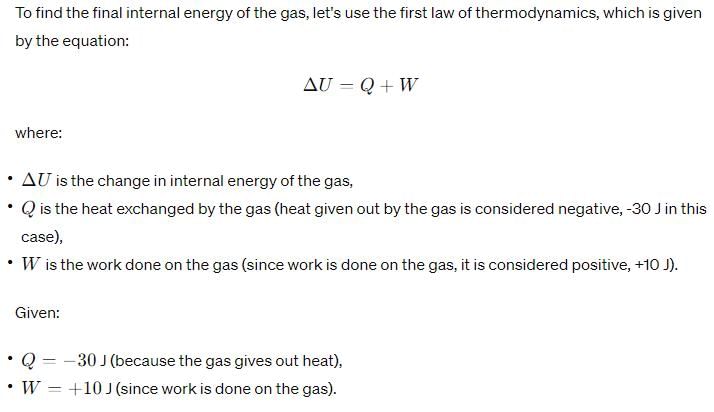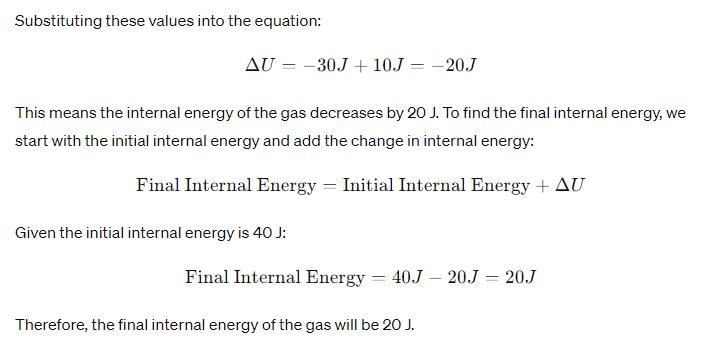Mechanical Engineering Exam > Mechanical Engineering Questions > In a thermal process, the pressure of a fixed...
Start Learning for Free
In a thermal process, the pressure of a fixed mass of a gas is changed in such a manner that the gas molecules give out the heat of 30 J and work of 10 J is done on the gas. If the initial internal energy of the gas was 40 J, then the final internal energy will be?
- a)30 J
- b)20 J
- c)60 J
- d)40 J
Correct answer is option 'B'. Can you explain this answer?
Verified Answer
In a thermal process, the pressure of a fixed mass of a gas is changed...
∆Q = (Uf - Ui) + ∆W
30 = Uf - 40 + 10
Uf = 60J.
30 = Uf - 40 + 10
Uf = 60J.
Most Upvoted Answer
In a thermal process, the pressure of a fixed mass of a gas is changed...


Free Test
FREE
| Start Free Test |
Community Answer
In a thermal process, the pressure of a fixed mass of a gas is changed...
Solution:
Given data:
- Heat given out by the gas, Q = 30 J
- Work done on the gas, W = 10 J
- Initial internal energy of the gas, U_initial = 40 J
Calculating the final internal energy:
- In a thermal process, the change in internal energy (ΔU) of a gas is given by the sum of heat added to the gas (Q) and the work done by the gas (W). This can be represented by the equation: ΔU = Q - W
- Substituting the given values, we get: ΔU = 30 J - 10 J = 20 J
- The final internal energy (U_final) of the gas can be calculated by adding the change in internal energy (ΔU) to the initial internal energy (U_initial). This can be represented by the equation: U_final = U_initial + ΔU
- Substituting the values, we get: U_final = 40 J + 20 J = 60 J
Therefore, the final internal energy of the gas will be 60 J.

|
Explore Courses for Mechanical Engineering exam
|

|
Question Description
In a thermal process, the pressure of a fixed mass of a gas is changed in such a manner that the gas molecules give out the heat of 30 J and work of 10 J is done on the gas. If the initial internal energy of the gas was 40 J, then the final internal energy will be?a)30 Jb)20 Jc)60 Jd)40 JCorrect answer is option 'B'. Can you explain this answer? for Mechanical Engineering 2025 is part of Mechanical Engineering preparation. The Question and answers have been prepared according to the Mechanical Engineering exam syllabus. Information about In a thermal process, the pressure of a fixed mass of a gas is changed in such a manner that the gas molecules give out the heat of 30 J and work of 10 J is done on the gas. If the initial internal energy of the gas was 40 J, then the final internal energy will be?a)30 Jb)20 Jc)60 Jd)40 JCorrect answer is option 'B'. Can you explain this answer? covers all topics & solutions for Mechanical Engineering 2025 Exam. Find important definitions, questions, meanings, examples, exercises and tests below for In a thermal process, the pressure of a fixed mass of a gas is changed in such a manner that the gas molecules give out the heat of 30 J and work of 10 J is done on the gas. If the initial internal energy of the gas was 40 J, then the final internal energy will be?a)30 Jb)20 Jc)60 Jd)40 JCorrect answer is option 'B'. Can you explain this answer?.
In a thermal process, the pressure of a fixed mass of a gas is changed in such a manner that the gas molecules give out the heat of 30 J and work of 10 J is done on the gas. If the initial internal energy of the gas was 40 J, then the final internal energy will be?a)30 Jb)20 Jc)60 Jd)40 JCorrect answer is option 'B'. Can you explain this answer? for Mechanical Engineering 2025 is part of Mechanical Engineering preparation. The Question and answers have been prepared according to the Mechanical Engineering exam syllabus. Information about In a thermal process, the pressure of a fixed mass of a gas is changed in such a manner that the gas molecules give out the heat of 30 J and work of 10 J is done on the gas. If the initial internal energy of the gas was 40 J, then the final internal energy will be?a)30 Jb)20 Jc)60 Jd)40 JCorrect answer is option 'B'. Can you explain this answer? covers all topics & solutions for Mechanical Engineering 2025 Exam. Find important definitions, questions, meanings, examples, exercises and tests below for In a thermal process, the pressure of a fixed mass of a gas is changed in such a manner that the gas molecules give out the heat of 30 J and work of 10 J is done on the gas. If the initial internal energy of the gas was 40 J, then the final internal energy will be?a)30 Jb)20 Jc)60 Jd)40 JCorrect answer is option 'B'. Can you explain this answer?.
Solutions for In a thermal process, the pressure of a fixed mass of a gas is changed in such a manner that the gas molecules give out the heat of 30 J and work of 10 J is done on the gas. If the initial internal energy of the gas was 40 J, then the final internal energy will be?a)30 Jb)20 Jc)60 Jd)40 JCorrect answer is option 'B'. Can you explain this answer? in English & in Hindi are available as part of our courses for Mechanical Engineering.
Download more important topics, notes, lectures and mock test series for Mechanical Engineering Exam by signing up for free.
Here you can find the meaning of In a thermal process, the pressure of a fixed mass of a gas is changed in such a manner that the gas molecules give out the heat of 30 J and work of 10 J is done on the gas. If the initial internal energy of the gas was 40 J, then the final internal energy will be?a)30 Jb)20 Jc)60 Jd)40 JCorrect answer is option 'B'. Can you explain this answer? defined & explained in the simplest way possible. Besides giving the explanation of
In a thermal process, the pressure of a fixed mass of a gas is changed in such a manner that the gas molecules give out the heat of 30 J and work of 10 J is done on the gas. If the initial internal energy of the gas was 40 J, then the final internal energy will be?a)30 Jb)20 Jc)60 Jd)40 JCorrect answer is option 'B'. Can you explain this answer?, a detailed solution for In a thermal process, the pressure of a fixed mass of a gas is changed in such a manner that the gas molecules give out the heat of 30 J and work of 10 J is done on the gas. If the initial internal energy of the gas was 40 J, then the final internal energy will be?a)30 Jb)20 Jc)60 Jd)40 JCorrect answer is option 'B'. Can you explain this answer? has been provided alongside types of In a thermal process, the pressure of a fixed mass of a gas is changed in such a manner that the gas molecules give out the heat of 30 J and work of 10 J is done on the gas. If the initial internal energy of the gas was 40 J, then the final internal energy will be?a)30 Jb)20 Jc)60 Jd)40 JCorrect answer is option 'B'. Can you explain this answer? theory, EduRev gives you an
ample number of questions to practice In a thermal process, the pressure of a fixed mass of a gas is changed in such a manner that the gas molecules give out the heat of 30 J and work of 10 J is done on the gas. If the initial internal energy of the gas was 40 J, then the final internal energy will be?a)30 Jb)20 Jc)60 Jd)40 JCorrect answer is option 'B'. Can you explain this answer? tests, examples and also practice Mechanical Engineering tests.

|
Explore Courses for Mechanical Engineering exam
|

|
Signup for Free!
Signup to see your scores go up within 7 days! Learn & Practice with 1000+ FREE Notes, Videos & Tests.


















